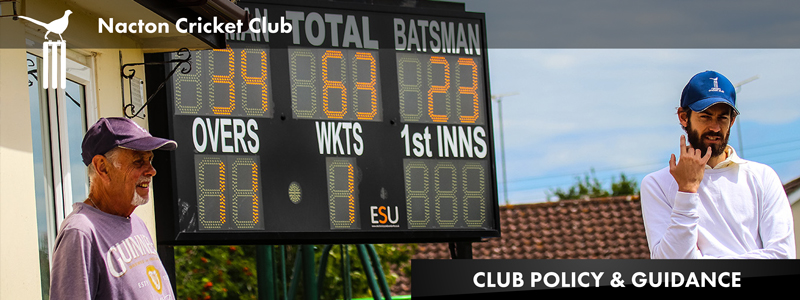
Nacton Cricket Club has adopted the policy of the ECB and Child Protection in Sport Unit. This policy provides guidance on how Nacton Cricket Club (the club) uses the internet and social media, and the procedures for doing so. It also outlines how we expect members and volunteers, children or young people who are members of the cricket club to behave online.
Aims
The aims of our online safety policy are:
- to protect all children and young people involved with the club and who make use of technology (such as mobile phones, games consoles and the internet) while in our care;
- to provide members and volunteers with policy and procedure information regarding online safety and inform them how to respond to incidents;
- to ensure the club is operating in line with our values and within the law regarding how we behave online.
Understanding the online world
As part of using the internet and social media, the club will:
- understand the safety aspects – including what is acceptable and unacceptable behaviours for members and children – when using websites, social media, apps and other forms of digital communication
- be aware that it doesn’t matter what device is being used for digital interaction, but that the same safety aspects apply whether it is a computer, mobile phone or game console
- when using social media platforms (including Facebook, Twitter and Instagram), ensure that we adhere to relevant legislation and good practice guidelines
- regularly review existing safeguarding policies and procedures to ensure that online safeguarding issues are fully integrated, including:
- making sure concerns of abuse or disclosures that take place online are written into our reporting procedures
- incorporating online bullying (cyberbullying) in our anti-bullying policy
- provide training for the person responsible for managing the club’s online presence
Managing our online presence
Our online presence through our website or social media platforms will adhere to the following guidelines:
- all social media accounts will be password -protected;
- the account will be monitored by a designated person, who will have been appointed by the club committee;
- the designated person managing our online presence will seek advice from our designated safeguarding person to advise on safeguarding requirements;
- inappropriate posts by children or members will be removed, explain why, and informing anyone who may be affected (as well as the parents of any children involved);
- account, page and event settings will be set to ‘private’ so that only invited club members can see their content;
- identifying details such as a child’s home address, school name or telephone number shouldn’t be posted on social media platforms;
- any posts or correspondence will be consistent with our aims;
- we’ll make sure children and young people are aware of who manages our social media accounts and who to contact if they have any concerns about the running of the account;
- parents will be asked to give their approval for us to communicate with their children through social media, or by any other means of communication;
- parents will need to give permission for photographs or videos of their child to be posted on social media
- all of our accounts and email addresses will be appropriate and fit for purpose.
What we expect of members and volunteers
- members should be aware of this policy and behave in accordance with it;
- members should seek advice of the Club Welfare Officer if they have any concerns about the use of the internet or social media
- members should communicate any messages they wish to send out to children and young people to the designated person responsible for the club’s online presence;
- members should not ‘friend’ or ‘follow’ children or young people from personal accounts on social media;
- members should make sure any content posted is accurate and appropriate, as young people may ‘follow’ them on social media;
- members should not communicate with young people via personal accounts or private messages;
- rather than communicating with parents through social media accounts, members should choose a more formal means of communication, such as face to face, in an email or in writing, or use a club account, profile or website;
- at least one other member should be copied in to any emails sent to children or young people;
- members should avoid communicating with children or young people via email outside appropriate hours;
- emails should be signed off in a professional manner, avoiding the use of emojis or symbols such as ‘kisses’ (X’s);
- any disclosures of abuse reported through social media should be dealt with in the same way as a face-to-face disclosure, according to our reporting procedures;
- smartphone users should respect the private lives of others and not take or distribute pictures of other people if it could invade their privacy;
- staff and young people must not engage in sexting or send pictures to anyone that are obscene, indecent or menacing;
What we expect of children and young people
- children should be aware of this online safety policy and agree to its terms
- we expect children and young people’s behaviour online to be consistent with the guidelines
Using mobile phones or other digital technology to communicate
When using mobile phones (or other devices) to communicate by voice, video or text (including texting, email and instant messaging), we’ll take the following precautions to ensure young people’s safety:
- members will avoid having children’s or young people’s personal mobile numbers and will instead seek contact through a parent or guardian
- we’ll seek parental permission on each occasion we need to contact children or young people directly; the purpose for each contact will be clearly identified and agreed upon
- a method of accountability will be arranged, such as copies of texts also being sent to the clubs welfare officer or to parents
- texts will be used for communicating information – such as reminding children or young people about upcoming events, which kit to bring or practice timings – and not to engage in conversation
- if a young person misinterprets such communication and tris to engage a member in conversation, the member will take the following steps:
- end the conversation or stop replying
- suggest discussing the subject further at the next practice or event
- if concerned about the child or young person, provide contact details for the welfare officer or appropriate agencies
Using mobile phones during sports activities
So that all children can enjoy and actively take part in sports activities, we discourage the use of mobile phones during such activities. As part of this policy we will:
- make children aware of how and who to contact if there is an emergency or a change to previously agreed arrangements with the club
- inform parents of appropriate times they can contact children who are away on trips and discourage them from attempting contact outside of these times
- advise parents that it may not be possible to contact children during activities and provide a contact within the club who will be reachable should there be an emergency
- explain to young people how using mobile phones during activities has an impact on their safe awareness of their environment, and their level of participation and achievement
Use of other digital devices and programmes
The principles in this policy apply no matter which current or future technology is used – including computers, laptops, tablets, web-enabled games consoles and smart TVs – and whether an app, programme or website is used. If any digital devices are used as part of activities within the club:
- we expect children and young people to adhere to the guidelines surrounding online use and behaviour set out in our policy
- we’ll establish appropriate restrictions, more commonly known as ‘parental controls’, on any device provided to prevent misuse or harm
As a club, we commit to implementing this policy and addressing any concerns quickly and within these guidelines.
![]() Download the Online, Social Media, Text and Communications Policy here
Download the Online, Social Media, Text and Communications Policy here



